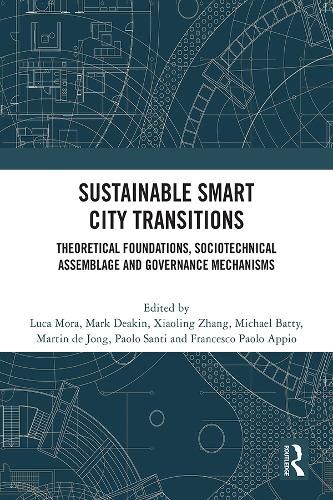Readings Newsletter
Become a Readings Member to make your shopping experience even easier.
Sign in or sign up for free!
You’re not far away from qualifying for FREE standard shipping within Australia
You’ve qualified for FREE standard shipping within Australia
The cart is loading…






This book enhances the reader's understanding of the theoretical foundations, sociotechnical assemblage, and governance mechanisms of sustainable smart city transitions.
Drawing on empirical evidence stemming from existing smart city research, the book begins by advancing a theory of sustainable smart city transitions, which forms bridges between smart city development studies and some of the key assumptions underpinning transition management and system innovation research, human geography, spatial planning, and critical urban scholarship. This interdisciplinary theoretical formulation details how smart city transitions unfold and how they should be conceptualized and enacted in order to be assembled as sustainable developments. The proposed theory of sustainable smart city transitions is then enriched by the findings of investigations into the planning and implementation of smart city transition strategies and projects.
Focusing on different empirical settings, change dimensions, and analytical elements, the attention moves from the sociotechnical requirements of citywide transition pathways to the development of sector-specific smart city projects and technological innovations, in particular in the fields of urban mobility and urban governance.
This book represents a relevant reference work for academic and practitioner audiences, policy makers, and representative of smart city industries.
The chapters in this book were originally published as a special issue of the Journal of Urban Technology.
$9.00 standard shipping within Australia
FREE standard shipping within Australia for orders over $100.00
Express & International shipping calculated at checkout
This book enhances the reader's understanding of the theoretical foundations, sociotechnical assemblage, and governance mechanisms of sustainable smart city transitions.
Drawing on empirical evidence stemming from existing smart city research, the book begins by advancing a theory of sustainable smart city transitions, which forms bridges between smart city development studies and some of the key assumptions underpinning transition management and system innovation research, human geography, spatial planning, and critical urban scholarship. This interdisciplinary theoretical formulation details how smart city transitions unfold and how they should be conceptualized and enacted in order to be assembled as sustainable developments. The proposed theory of sustainable smart city transitions is then enriched by the findings of investigations into the planning and implementation of smart city transition strategies and projects.
Focusing on different empirical settings, change dimensions, and analytical elements, the attention moves from the sociotechnical requirements of citywide transition pathways to the development of sector-specific smart city projects and technological innovations, in particular in the fields of urban mobility and urban governance.
This book represents a relevant reference work for academic and practitioner audiences, policy makers, and representative of smart city industries.
The chapters in this book were originally published as a special issue of the Journal of Urban Technology.